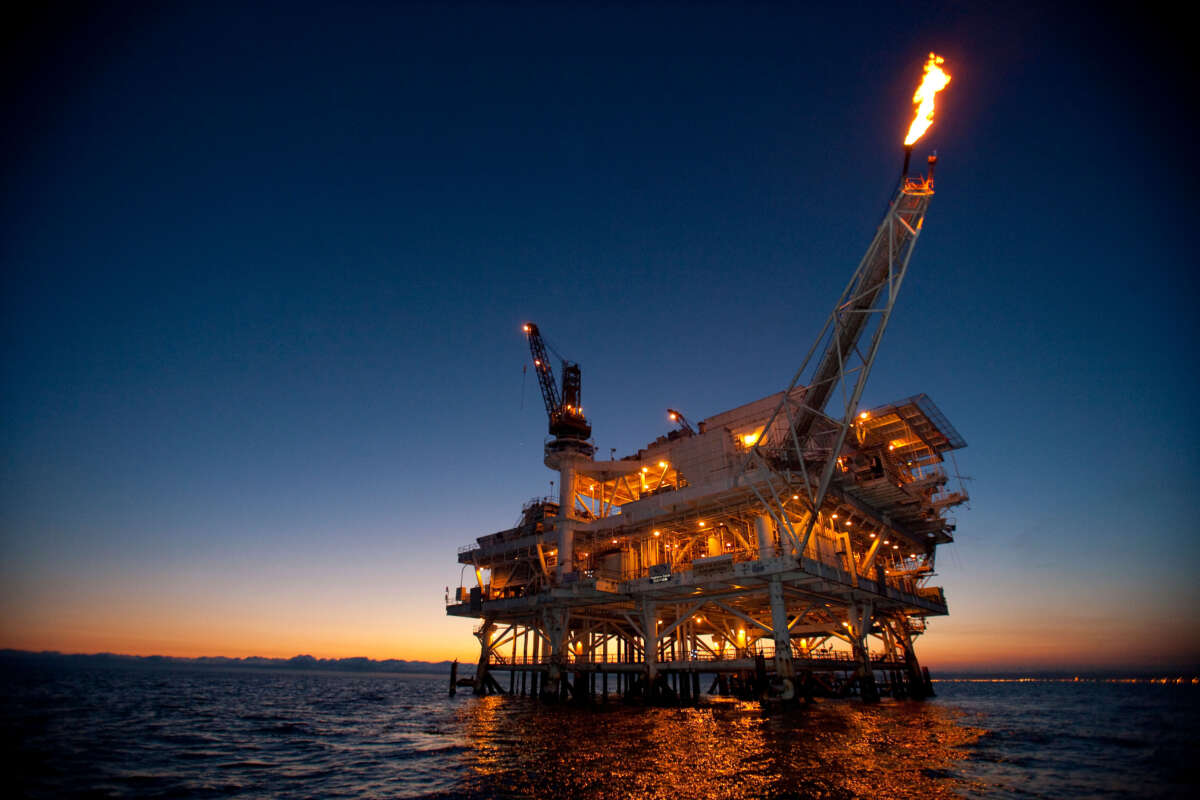Honest, paywall-free news is rare. Please support our boldly independent journalism with a donation of any size.
On Monday, the U.S. Supreme Court declined to hear the fossil fuel industry’s challenge to a 2018 court-ordered moratorium on offshore fracking in federal Pacific Ocean waters off the coast of California, a rare victory for environmental groups and coastal conservationists who say producing oil and gas from under the seafloor poses a serious threat to ocean ecosystems and the climate.
The decision leaves in place a June 2022 ruling by the U.S. Court of Appeals for the Ninth Circuit that found federal regulators had violated the Endangered Species Act and other environmental laws when they allowed fracking and acidizing on drilling rigs off the coast of California without properly examining potential harms to marine life.
In a bid to reopen oil and gas wells off the California coast to fracking and acidizing, two controversial extraction techniques for squeezing the remaining reserves from aging undersea wells, fossil fuel companies and the American Petroleum Institute petitioned the Supreme Court in January to review the case. The Supreme Court declined the petition along with a number of others on Monday.
While the far right majority on the Supreme Court has been willing to decimate federal clean air and clean water protections at the behest of conservative idealogues and polluters, the high court has also gravitated toward blockbuster cases that set nationwide precedents, which could hint at why a dispute over offshore oil and gas out of California did not make the cut.
That leaves a prohibition on fracking in federal waters off the coast of California in place, at least for now. Last year’s Ninth Circuit decision upheld a lower court ruling that prohibits new fracking permits for federally leased wells until Interior Department regulators complete a full environmental review that considers climate-friendly alternatives.
“The fracking ban will help prevent more toxic chemicals from poisoning fish, sea otters and other marine life,” said Kristen Monsell, the oceans program litigation director at the Center for Biological Diversity, in a statement. “But our ocean won’t be truly protected until offshore drilling stops once and for all.”
Challenges to offshore fracking have wound through courts in California since 2014, when federal records requests filed by Truthout and environmental groups uncovered details about offshore fracking for the first time. While smaller in size and scope compared to onshore fracking, offshore fracking and acidizing involves chemicals that can harm marine life, and produces billions of gallons of wastewater that is dumped into the ocean.
At the time, the California-based Environmental Defense Center was focused on fracking permits provided to a handful of offshore rigs located in the Santa Barbara Channel, which is also home to a vital sanctuary for whales, fish, sea otters, and all sorts of marine life. News about fracking in the channel caused an uproar up and down the California coast that quickly found its way into public meetings and then the courts.
“It has been a long road to today. We first found out these practices were happening in the Santa Barbara Channel with zero environmental review, through the formal process of requesting documents under the Freedom of Information Act,” said Maggie Hall, an attorney for the Environmental Defense Center, in an email. “We uncovered at least 51 permits approving fracking and acidizing at the time.”
Environmental groups then filed two rounds of lawsuits as regulators and the public scrambled to understand offshore fracking and acidizing, ultimately resulting in the Ninth Circuit Court of Appeals ruling that such “enhanced” extraction techniques required a full impact review under federal environmental laws.
“These practices involve the discharge of toxic chemicals, many of which are known carcinogens, directly into our sensitive marine environment,” Hall said. “Given the current climate crisis, now more than ever our focus needs to be on renewables, and not getting every last drop of oil out of these wells, at the expense of the environment.”
Further investigation revealed that offshore fracking — and dumping of the chemical-laced wastewater it produces — has been a common practice for exploiting aging oil and gas wells in the Gulf of Mexico, where heavy offshore drilling is widespread and loosely regulated compared to California.
Back in California, environmentalists are hoping the Supreme Court’s decision to avoid questions over how regulators should review the environmental impacts of undersea fracking and acidizing is a step toward shutting down offshore drilling for good.
“We hope this is the beginning of the end of drilling off California’s coast,” Monsell said on Monday.
Media that fights fascism
Truthout is funded almost entirely by readers — that’s why we can speak truth to power and cut against the mainstream narrative. But independent journalists at Truthout face mounting political repression under Trump.
We rely on your support to survive McCarthyist censorship. Please make a tax-deductible one-time or monthly donation.
